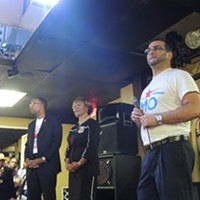If you're wondering why more unaffiliated candidates don't run for office in local elections, the answer lies in a century old law that continues to hurt anyone not toeing the traditional party line.
More than 100 years ago, the North Carolina General Assembly began requiring signed petitions from unaffiliated candidates before they could appear on a ballot. To this day, those candidates must collect signatures from at least 4 percent of registered voters in their respective district while candidates running as Democrat or Republican in Charlotte elections simply submit a "notice of candidacy" and pay a filing fee.
In 2013, Michael Zytkow became the first unaffiliated candidate in at least 15 years to meet the requirement after walking door-to-door collecting signatures. While he lost 33 pounds in the process, he said it took its toll on him in other ways that affected his decision whether to run in this year's elections.
"If I wanted to run again this year," he said, "I would have to collect signatures all over again."
Mecklenburg County Board of Elections spokesperson Kristin Mavromatis confirmed that Zytkow turned in 7,480 signatures, well over twice the 3,063 he needed. Even then, Zytkow barely made the four percent line, as only 3,858 of his signatures were validated. Petition signers are asked to include their full name, address and date of birth. The BOE then verifies that information.
"Most of them don't get the required signatures," Mavromatis said.
Come election time, Zytkow received 3,653 votes; not enough to win. Unsure if he'll run again in the future, he remains passionate about election reform and believes he would've received more votes if straight-party voting had been illegal at the time as it is now.
It's important to note that "unaffiliated" and "independent" isn't the same thing. The Green Party, for example, falls under the "independent" label.
Shawn Greeson is running this year as an at-large city council candidate in the Democratic primary and was endorsed by the Green Party. "[Unaffiliated candidates] are not taken seriously; it's kind of that option people vote for because they don't want to vote for other people."
Mavromatis said there's been a rise in the number of voters registering as Unaffiliated, however, she also said there's been an increase in voters jumping from Unaffiliated to a specific party.
Unaffiliated voters can vote in either party's primary, but not both. If there is a run-off primary, voters may not switch parties.
